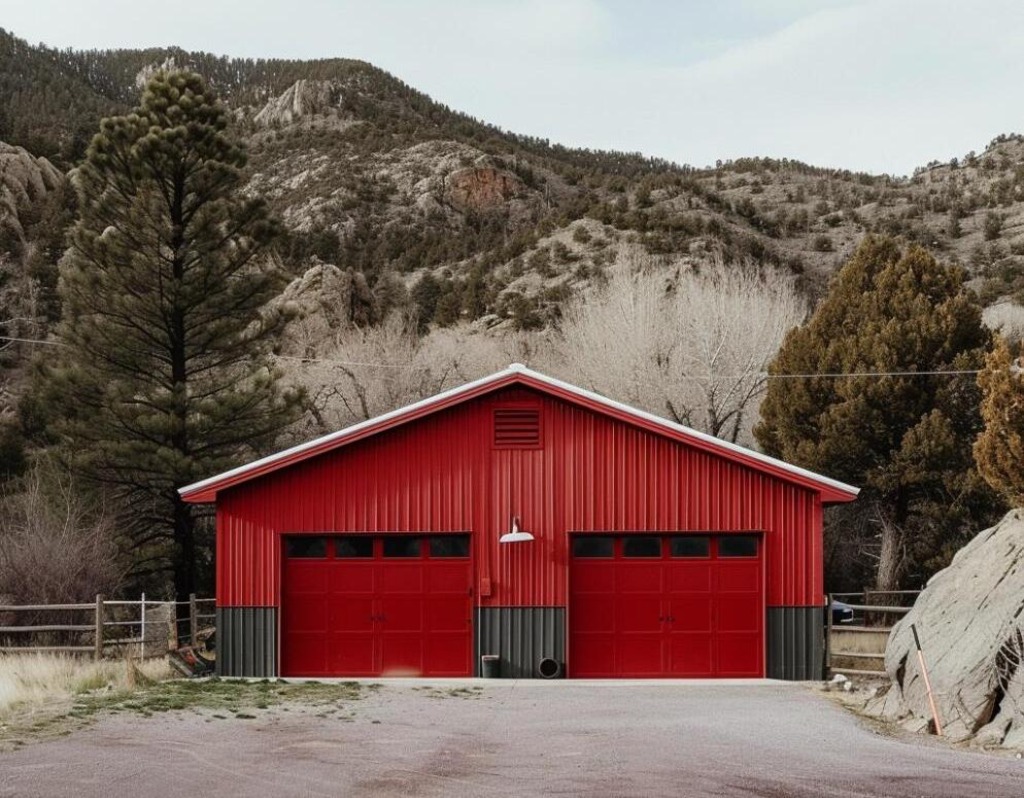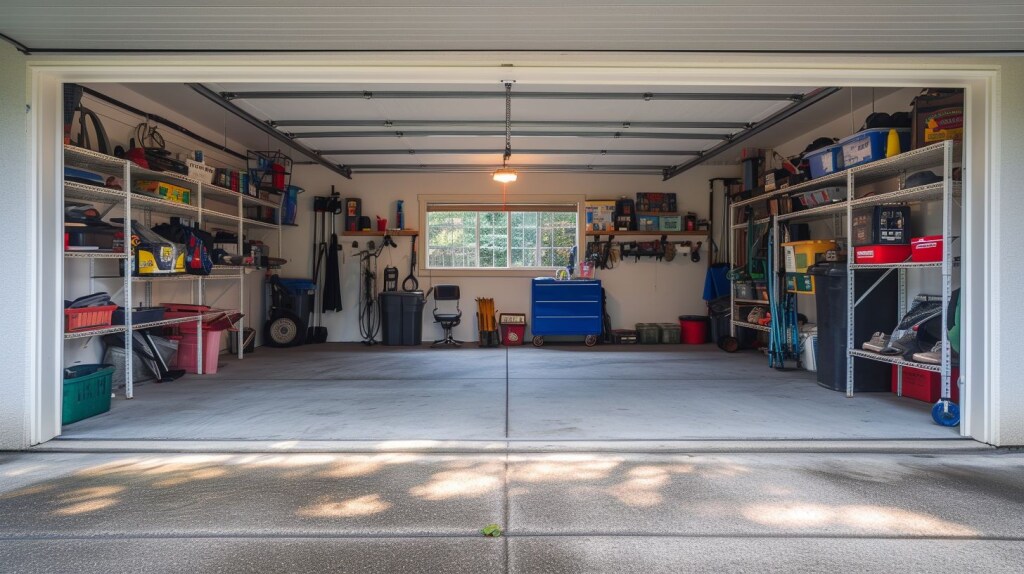
Garages are more than just parking spots; they’re vital for storage and sometimes even act as workshops. Standard 2-car garages typically measure between 20×20 feet to 28×28 feet, offering ample space for vehicles and more. Our guide dives into the essentials of garage sizing, giving you the insights to make smart choices about your own space.
Table of Contents
Understanding 2-Car Garage Dimensions
When pondering the puzzle of parking and storage solutions, grasping the dimensions of a two-car garage is key. It’s not just about ensuring your vehicles fits snugly but also about crafting a space that meets multifaceted needs—from shielding your shiny Mercedes-Benz to stowing away seasonal gear.
Width
A two-car garage needs enough room for vehicles to sit side by side. According to Sheds Unlimited, the typical width is at least 20 feet. That’s just right for fitting in any pair of cars without squeezing them too tight. If you go wider, like 24 feet, that’s even better! You’ll have extra space – about three feet on each side of the cars and between them, as recommended by J.D. Power.
Now imagine trying to park bigger rides like SUVs or trucks; things can get snug – a 24-foot wide garage gives both vehicles plenty of room to breathe. Additionally, you won’t bump doors when getting in or out! And there’s this sweet bonus: adding storage shelves or hanging bikes up becomes easier with more width.
Length/Depth
Garages need enough depth to fit cars comfortably. Most 2-car garages have a depth of at least 20 feet, allowing space for vehicle accommodation. Alan’s Factory Outlet advises getting a garage with a length of 22 to 24 feet for owners of longer vehicles, such as trucks or SUVs.
If you plan on using your garage for more than parking — maybe as storage space, a shouse, or a workshop — consider a garage that’s 24×24 feet. This design offers extra room for workbenches or overhead storage systems in front of parked vehicles.
If you own particularly long cars or want ample workspace behind them, opting for dimensions around 24×30 feet will give that added flexibility without cramping your style.
Height
Moving beyond length and depth, let’s look up—literally. A standard two-car garage stands at 8 feet in height, giving ample clearance for most vehicles—from compact cars to a trusty Mustang. This dimension is essential because it affects what you can store above your car. Think bicycles hanging from the ceiling or shelves lined with tools.
Taller garages are even better if you own an SUV or plan on housing minivans and sports cars that might come with rooftop accessories. With a typical door height of 7 feet, most vehicles slide in easily, but remember those extra few inches in ceiling space? They’re perfect for stashing away seasonal decorations or storing bulk items out of sight.
And if you’re eyeing hybrid cars or sleek convertibles with fancy tops, that added vertical room means you won’t have to worry about opening roofs or antennas scraping the ceiling!
Receive Quotes from Multiple Barndominium Builders & Kit Providers Near You Today (It's Free!)
Fill in this 1-minute form below and receive estimates for your project without having to find them yourself! Let them do the work.

Common Sizes of a 2-Car Garage
When envisioning the perfect fit for your pair of vehicles—the typical sizes of a 2-car garage offer you a canvas of options. The standard size is cozy enough for daily drivers, while oversized versions provide that extra elbow room for weekend projects and storage whims.
Standard Size
Most people pick a 2-car garage that’s 24×24 feet. It fits two cars with room to open doors and walk around. This size is excellent for folks who want extra space for tools or bikes. The average ceiling height is about 8 feet, perfect for storing things high.
If you own two cars, they’ll fit comfortably in a standard-sized garage. You can park both side by side and still have space to move. Some garages are even 24×30 feet — giving you more room at the back for storage or a workbench!
Oversized Size
An oversized 2-car garage gives you plenty of space; almost as much room as a small 3-car garage. Think about spaces bigger than the standard 24×24 feet. These garages can be as large as 30×30 feet, giving you a vast area of up to 900 square feet. Imagine parking your cars and still having space for a workshop or storage.
With an attic two-car garage or a two-story option, the sky’s the limit on storage potential. The added height makes it perfect for storing tall items or adding shelves up high. You can park your cars below and keep seasonal decorations, sports gear, and tools above. This design means more floor space stays free for daily use.
Factors to Consider When Choosing Garage Dimensions
Deciding on the correct dimensions for a two-car garage is more complex than you might think; it’s about more than just ensuring your vehicles fit. From how you plan to use the space to zoning laws that can play party pooper to your grand designs, a variety of elements come into play that could steer your decision-making process down unexpected roads.
Function
Your 2-car garage needs to match your lifestyle. Think about what you’ll use the garage for beyond parking cars. You may want space for a workshop, storage areas, or even a gym. Ensure there’s enough room to open car doors and move around comfortably.
Check that the height fits your needs, too. You need extra clearance if you have an SUV with a rooftop box or plan to store kayaks overhead. And don’t forget about good lighting and ventilation—it keeps your garage pleasant and safe to use.

Building Codes
Building codes are a big deal when planning your 2-car garage. They can change depending on where you live. These rules ensure your garage is safe and fits well in the neighborhood. You might find limits on how tall or wide you can build.
Always check these codes before starting your project. A design pro can help you meet all the rules and pick the best size for your needs. They’ll also look at airflow and light to ensure your garage interior feels good.
The Cost of a 2-Car Metal Garage
The price of building a 2-car metal garage is not fixed. It can change based on size, location, and whether you build it yourself or hire someone. For a basic 2-car garage, the cost usually starts around $4,500 but could go up to $19,000 with more features or custom designs.
Choosing a standard size like 20×20 feet might keep costs lower than going for an oversized one. Bigger sizes mean more materials, and that raises the expense. The total area—anywhere from 400 to 784 square feet—also plays a role in how much you end up spending. Keep in mind that adding electricity or plumbing will also increase your budget. Let’s examine estimated prices from various builders and observe the variations in these costs.
| Builder | Garage Dimensions | Estimated Price Range Without Customizations |
| Eversafe Buildings | 22×25 | From $8,349 |
| Boss Buildings | 18×20 | $4500-$9,890 |
| AA Metal Buildings | 24×20 | From $8,700 |
| 24×25 | From $9,900 | |
| 24×30 | From $12,238 |
Maximizing Garage Space
Unlock the full potential of your 2-car garage with clever strategies to make every inch count—let’s dive into how you can create an organized, efficient space that meets all your needs.
Increase Vertical Dimensions
Going up is a smart move in a two-car garage. It lets you store more without eating up floor space. Here’s how you can raise the roof on storage:
- Look at your garage’s ceiling height. Is there room to go higher? Taller spaces mean more storage options.
- Install shelves that reach up high. Use sturdy materials and secure them well.
- Consider a car lift if you’ve got the height. This frees up space below for another vehicle or more storage.
- Hang bikes and tools on wall-mounted racks to keep the floor clear.
- Think about overhead storage units. They’re great for stuff you use sparingly, like holiday decorations.
- Plan for potential future needs, like a taller vehicle or new hobbies that need space.
- If adding a second level sounds good, check local building codes first. You want to make sure everything is safe and legal.

Get Organized
A well-organized 2-car garage can hold much more than just cars. It gives you space to store tools, sports gear, and other items neatly. Here’s how to organize your garage:
- Install shelves for boxes and bins along the walls. Label each one so you know where everything goes.
- Hang bikes from the ceiling or on wall mounts to save floor space.
- Use a pegboard for hand tools. It’s easy to see what you have, and tools are quick to grab.
- Place hooks for gardening tools and hoses on the walls. This keeps them off the ground and out of the way.
- Consider cabinets with doors for items you want to keep hidden or dust-free.
- Add a workbench if you do DIY projects. Make sure it has storage underneath.
- Use overhead racks for seasonal items like holiday decorations or camping gear.
Conclusion
A 2-car garage gives you space for your cars and more. Sizes range from 20×20 to 28×28 feet, so think about what fits best for you. Choose wisely—balance size with cost and needs. Whether you’re searching for a 2-car garage or any other particular size, we’ve got the ideal answer for your requirements. Simply complete the form provided, and a nearby dealer will contact you swiftly. Your perfect metal garage is just one form submission away. To explore additional information on quirky housing options like barndominiums, pole barns, and shipping container homes, follow our Facebook Page.

